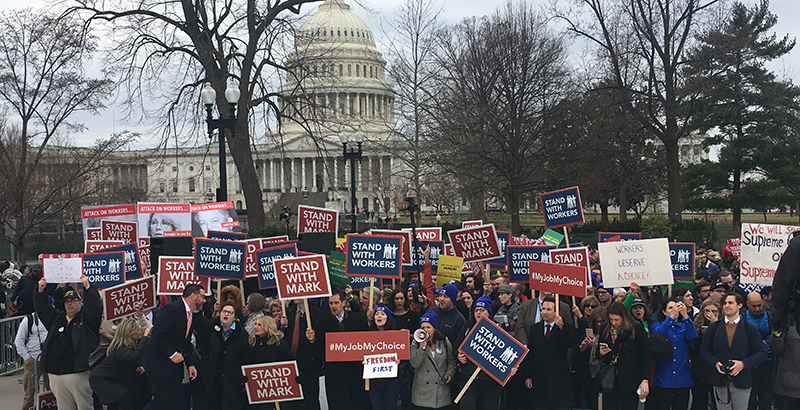Human Right or Federal Overreach? House Members Spar Over Legislation to Protect Public Workers

House members and advocates Wednesday sparred over legislation that would protect collective bargaining rights for public employees, a year after the Supreme Court ended mandatory dues payments for those workers.
The Janus decision “fundamentally undermines public service workers’ ability to collectively bargain. Congress has both the power and responsibility to protect the organizing and collective bargaining rights of all workers, no matter where they live or work,” said Rep. Frederica Wilson, Democrat of Florida and the chair of the Health, Employment, Labor and Pensions subcommittee.
Rep. Tim Walberg of Michigan, the ranking Republican on the subcommittee, called the legislation “another Democrat attempt to put the thumb on the scale in favor of forced unionization.”
The debate focused on two bills. The Public Service Freedom to Negotiate Act, introduced Wednesday, would permit state and local workers to bargain collectively over wages, hours and other conditions. The other, the Public Safety Employer-Employee Cooperation Act, would apply those rights specifically to “public safety officials” like firefighters, police and EMTs.
Eight states do not permit collective bargaining by any public employees, and another 12 limit it to only certain professions, said Joseph Slater, a professor at the University of Toledo, who supports the bills.
Permitting public-sector workers to bargain also cuts down on disruptive labor strikes, like the teacher walkouts last year, which largely occur in states where public-sector workers have fewer rights, Slater said.
“The reason [for those strikes] is the workers feel, often justifiably, that they have no other options to get their employer to listen to their concerns, to really take them under consideration,” he added.
Republicans on the committee and some witnesses, meanwhile, challenged the bills as a violation of federalism.
“Congress has no business centralizing all of this power in the federal labor relations authority. It would be an enormous federal overreach and a violation of the principle of federalism to do so,” said Missouri state Sen. Robert Onder, a Republican. (He was the author of a bill that put new conditions on public-sector workers’ unionization and collective bargaining; a state judge granted an injunction barring the law from taking effect.)
But another principle of federalism is that Congress can step in to address problems when doing so is in the national interest, said Rep. Donna Shalala, Democrat of Florida.
There are plenty of examples of Congress setting national minimum standards in employment law, such as the Americans with Disabilities Act, the Equal Pay Act, and the Pregnancy Nondiscrimination Act, said Teague Paterson, deputy general counsel at the American Federation of State, County and Municipal Employees, which unsuccessfully defended mandatory union dues in the Janus case.
Democrats also said the lack of collective bargaining rights for public-sector workers in some states violates international norms.
“It is a fundamental human right. The idea that we’re having this hearing, and having people in the minority talk about how great it is that we’re denying a fundamental human right to American workers, is not something that would happen in virtually any other country in the world. It’s a shame on our country that we’re even having this discussion,” said Rep. Andy Levin, Democrat of Michigan.
Republicans, for their part, said the United States shouldn’t be compared to other countries. The issue isn’t barring people from joining unions but rather giving them the freedom to choose, Walberg said.
“We’re not against that. We’re saying there ought to be choice, that free citizens in a free country, unique and separate from any other nation in the world [should decide],” he said.
Get stories like these delivered straight to your inbox. Sign up for The 74 Newsletter

;)
